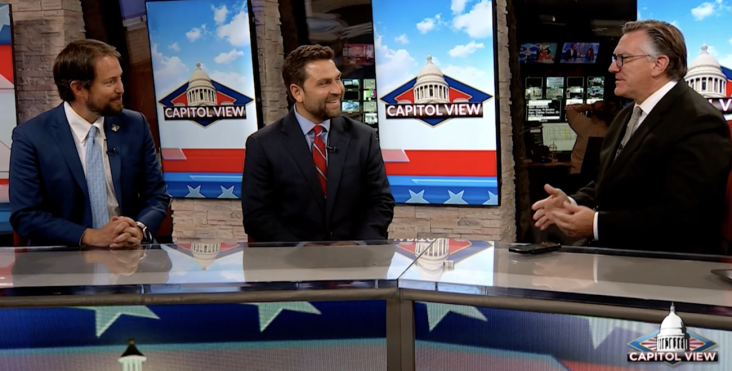State Senators clarify film incentive focus, say special session for tax cuts floating
by August 27, 2023 9:34 am 1,348 views

Left to right: Sen. Clarke Tucker, D-Little Rock, and Sen. Jonathan Dismang, R-Beebe.
Two of Arkansas’ leading state senators – Sen. Jonathan Dismang, R-Beebe, and Sen. Clarke Tucker, D-Little Rock – say that tax cuts and incentives on several fronts are being discussed in the interim and a possible special session could be forthcoming to handle some proposals.
Appearing on this week’s Capitol View program, Dismang and Tucker said a lot was done to provide more tools for the state’s film industry in this last session, but more may be needed. Last session, the two Senators spearheaded an effort to expand a filmmaker tax rebate from 20% to 25% and a tax credit from 20% to 25%.
“Just to expand on that, so the base credit or incentive for both the rebate and the credit was 20% and the top was 30%. So what we did was raise the base from 20% to 25% for both the rebate and the credit. And we created more ways by working in rural areas, economically depressed areas, hiring veterans in Arkansans to get that from 25% to the 30%,” Tucker said.
While the state does not carve out a specific line-item of money in the budget specifically for the incentives, the governor has traditionally used the Quick Action Closing Fund to handle these film rebates and incentives.
Dismang said it will help the film industry’s cause to provide a return on investment analysis of the rebates and credits to show it is a net positive for the state.
“We need to do a better job as a state demonstrating the return on those dollars. I would argue that the dollars being invested, that we’re putting in through incentives for film, we’re getting a return will be in excess of that in tax revenue for the state. Again, we need to do a better job of demonstrating that so we have something to take the legislature. And that’s really one thing that we asked for through the [Commerce] department this past year,” he said.
On Aug. 1 when the new rebates and tax credits went into effect, AEDC updated its website to help promote the changes to the law.
With another billion-dollar surplus accumulated in the last fiscal year, could a special session be on the horizon for broader individual and corporate tax cuts? Or will lawmakers push to wait until the fiscal session in February to address this issue?
“I think it’s becoming pretty clear, and I think we’ll hear some things soon, that we’ll have a special session prior to end of the year. I think one of the items will be tax cuts,” said Dismang, Co-chair of the Joint Budget Committee. “I think there’s some discussion about some other issues that I’m not as privy to that may make the call. But I do think that you’ll see us focus on some reductions on the corporate and individual income tax cuts.”
Dismang and Tucker emphasized the tax cuts would be based on anticipated future revenues, not the surplus money the state has in the bank.
“You should not cut taxes based on a one-time surplus,” said Tucker, who said he’d likely oppose more personal and corporate income tax cuts.
The two senators also said a special session call could deal with clean-up language or items that have arisen that need a quick fix to clarify confusion.
While legislators can make suggestions and will deal with the items on a special session call, Gov. Sarah Sanders is the only person who can actually make a call for a special session. She has given no indication if or when that might occur.
Dismang and Tucker also discussed the LEARNS Act, controversy over the teaching of African American history, and funding to support free and reduced school lunch costs. You can watch their full interview in the video below.
